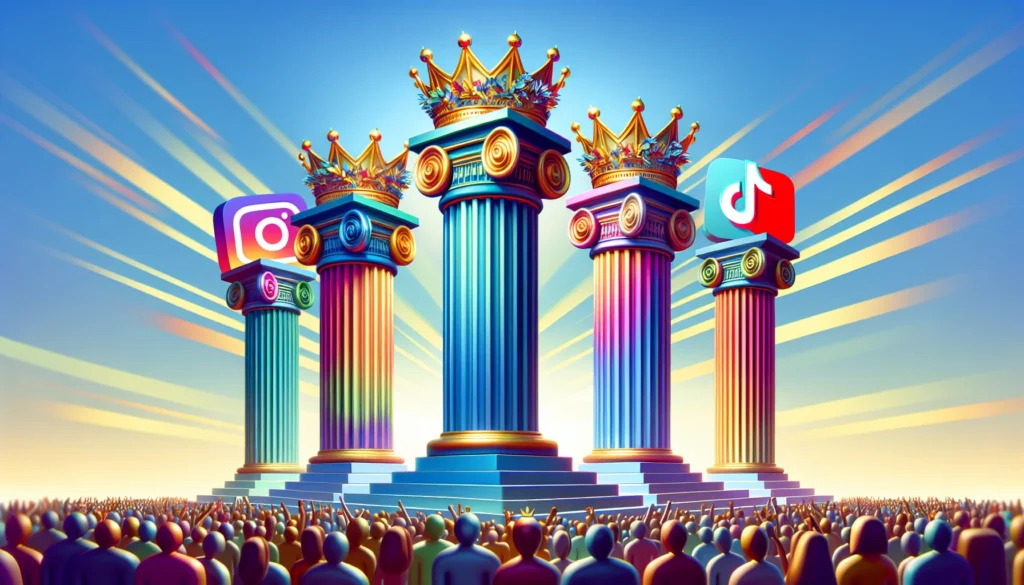Table of Contents[Hide][Show]
Influencer in marketing: a buzzword or a game changer for your brand’s growth? In a world where consumers are bombarded with endless ads, influencers cut through the noise by bringing credibility and personal touch to marketing. This article goes straight to the essentials, guiding you through influencers’ impactful roles and providing practical steps for leveraging their influence to elevate your brand. Prepare to gain direct insights without the excess.
Key Takeaways
Influencer marketing has evolved beyond celebrity endorsements, focusing on relatable social media individuals and leveraging conversations and communities to reach target audiences.
Effective influencer marketing strategies require aligning brand values with the influencer’s persona, identifying the target audience, and setting clear, measurable goals for campaign success.
Assessing the ROI of influencer campaigns involves careful budgeting, understanding influencer rate cards, and analytics that track metrics such as engagement and conversions to ensure alignment with marketing objectives.
Decoding Influencer Marketing: A Primer

Influencer marketing involves forming alliances with individuals with a significant online presence, thus bringing products or services to the fore. Capitalizing on the credibility and trust influencers have built with their followers through reputation, prestige, or being a digital creator allows brands to extend their reach and connect with audiences in a way that traditional advertising often fails to do.
This strategy isn’t just about broadcasting messages; it’s about creating conversations and building communities around shared values and experiences.
The Evolution of Influencer Marketing in the Digital Age
The influencer marketing industry realm has seen a remarkable transformation, shifting from the glamourous sphere of celebrity endorsements to a diverse network of social media influencers, each exerting influence in their distinct ways. As digital platforms burgeon, they create new avenues for brands to connect with audiences, making influencer collaborations and social media marketing more impactful. The Influencer Marketing Hub has become a crucial resource for brands navigating this ever-evolving landscape.
This evolution is a testament to the adaptability and potency of influencer marketing as a driving force in the digital age.
From Celebrity Endorsements to Social Media Stars
Gone are the days when celebrity endorsements were the only way to catch the public’s eye. Today’s influencer marketing relies on a more relatable cast, from reality TV stars to bloggers who share their lives with the world through influencer posts. This shift has fostered a new level of authenticity and connection, allowing brands to engage with audiences on a more personal plane.
Followers often regard influencers’ opinions more highly than those of celebrities, fueling brand loyalty and advocacy in an unparalleled fashion.
The Rise of Micro and Nano Influencers
Amidst the influencers’ ecosystem, mega influencers, micro influencers, and nano influencers have carved out their own niche, captivating highly engaged audiences with their authentic and relatable content. These influencers may have fewer followers, but their ability to foster deep, meaningful connections makes them invaluable assets for brands aiming to drive targeted and impactful marketing campaigns.
Crafting an Effective Influencer Marketing Strategy

Creating an effective influencer marketing campaign requires careful planning and strategy. This involves setting measurable goals, rigorously vetting potential influencers, and establishing a clear set of expectations for both parties. This ensures that each step, from concept to execution, aligns perfectly with the brand’s vision and campaign objectives.
Identifying Your Target Audience
A successful influencer marketing strategy hinges on a sharp focus on the target audience. Utilizing demographic profiling and persona creation is crucial in identifying the ideal consumers for your brand’s message. Understanding who your audience is, from their online behavior to their values and purchasing habits, guides the selection of influencers who can speak their language and resonate with their needs. For example, if you have a very niche product then you should target a specific influencer to sell your product who’s exiting following is your target market. This could make a huge impact on your small business marketing strategy.
Aligning Brand Values with Influencer Persona
The synergy between a brand’s ethos and an influencer’s persona is non-negotiable for an authentic and successful collaboration. It’s about choosing partners who embody your brand’s spirit, ensuring that their content doesn’t just market your products, but also amplifies the values you stand for. This congruence is the cornerstone of trust, influencing consumer perceptions and driving brand loyalty.
Platforms Powering Influencer Campaigns

The stage for influencer marketing is set across various social media platforms, each offering unique facets for content creation and audience engagement. Instagram, TikTok, and YouTube stand out as the frontrunners, providing diverse opportunities for influencers to share their stories and for brands to reach their campaign goals. Selecting the right platform is critical, as it can make or break the effectiveness of an influencer campaign.
Instagram’s Dominance in Visual Storytelling
Instagram’s prowess in visual storytelling has cemented its position as a dominant force in the influencer marketing arena. With its massive daily engagement and wide reach, Instagram influencers have become pivotal in shaping brand narratives and driving consumer interaction across the globe.
TikTok and the Viral Video Phenomenon
TikTok’s explosive growth and penchant for viral content have made it an indispensable platform for influencer marketing. The app’s format encourages creativity and spontaneity, enabling influencers to capture the zeitgeist and brands to tap into a wellspring of potential consumer engagement.
Budgeting for Influencer Collaborations
Understanding the financial aspects of influencer marketing can be as intricate as it is essential. Brands must carefully balance investment and impact, which involves comprehending the intricacies of influencer rate cards and allocating a comprehensive budget. This financial planning is not just about the cost of collaboration; it encompasses the entire spectrum of campaign expenses, including:
Product costs
Influencer fees
Production costs
Performance analysis
By considering all these factors, brands can make informed decisions and maximize the return on their influencer marketing investment.
Understanding Influencer Rate Cards
Influencer rate cards are a critical component in campaign budgeting, however they are influenced by factors such as follower count, platform choice, and engagement levels. These rate cards, often part of an influencer’s media kit, offer a clear picture of the financial expectations and help brands plan their influencer marketing expenditures wisely.
Measuring Success: Analytics for Influencer Campaigns
The success of an influencer marketing campaign is best evaluated through analytics. Tracking appropriate key performance indicators allows brands to assess their campaigns’ effectiveness, from increasing brand awareness to driving conversions. These metrics serve as the compass for navigating the vast sea of digital marketing, ensuring brands are headed in the right direction.
Engagement Metrics That Matter
Engagement metrics are the heartbeat of influencer marketing, revealing how deeply an influencer’s content resonates with their audience. By analyzing these interactions such as likes, comments, and shares, brands can understand the nuances of audience behavior and refine their strategies to foster even greater social media engagement.
The Role of Conversion Tracking
Conversion tracking stands as the final frontier in quantifying influencer marketing success, directly tying influencer activity to tangible results. Whether it’s through affiliate links or unique discount codes, tracking conversions helps brands illuminate the path from influencer endorsements to actual sales, providing a clear view of the campaign’s return on investment.
Spotlight on Successful Influencer Marketing Campaigns

Shining a light on successful influencer campaigns provides invaluable insights and inspiration for creating a successful digital marketing campaigns. Whether leveraging the power of multiple voices or fostering long-term partnerships, these real-world examples illustrate the potential of well-orchestrated influencer collaborations to skyrocket brand visibility and engagement.
Leveraging Multiple Influencers for Maximum Reach
Engaging multiple influencers can serve as a force multiplier for brand presence, tapping into a wider audience and generating a synergistic effect that amplifies campaign momentum. This strategy not only broadens visibility but also enhances the authenticity of the brand message, leading to a higher return on investment.
Long-Term Partnerships vs. One-Off Campaigns
In the realm of influencer marketing, long-term relationships are the bedrock upon which trust and brand loyalty are built. These enduring partnerships yield a continuity that one-off campaigns cannot match, fostering a genuine association between influencers and the brands they represent.
The Ethical Dimension: Transparency and Authenticity
In influencer marketing, transparency and authenticity form the ethical foundation, crucial for preserving consumer trust and a favorable brand reputation. In an era where consumers demand honesty from the brands they engage with, upholding these values is not just good practice—it’s a business imperative.
Navigating Disclosure Guidelines
Disclosure guidelines serve as the compass for ethical influencer marketing, ensuring that sponsored content is clearly marked and recognizable to audiences. Adhering to these guidelines, set forth by regulatory bodies like the FTC and ASA, reinforces the integrity of influencer marketing and bolsters consumer confidence.
Finding and Connecting with the Right Influencers

Finding the right influencer is a critical step in the influencer marketing journey. Brands need to explore the expansive digital landscape to discover influencers who align with their brand vision and connect with their target audience. This process involves exploring hashtags, reviewing brand mentions, and leveraging the capabilities of influencer marketing platforms.
Utilizing Influencer Marketing Platforms
Influencer marketing platforms like Tagger, Brandwatch, and Upfluence provide a streamlined approach to connecting brands with the right influencers. These platforms simplify the discovery process, manage campaign logistics, and track performance, making them indispensable tools for brands seeking to maximize their influencer marketing efforts.
Engaging with Niche Audience Specialists
Specialist influencers who cater to niche audiences can be the secret weapon in a brand’s influencer marketing arsenal. These individuals often command highly engaged followings within specific communities, providing brands with a direct line to passionate and receptive audiences.
Incorporating Influencer Content into Broader Marketing Efforts
For influencer marketing to have maximum impact, brands need to integrate influencer-generated content into their overall marketing campaigns. This approach not only reinforces the brand’s message across various touchpoints but also leverages the authenticity and creative flair that influencers bring to the table.
Companies can create a seamless and engaging brand experience for consumers by aligning influencer content with the brand’s image and making sure it complements other marketing strategies.
Repurposing Influencer Content Across Channels
Repurposing influencer content across marketing channels is a savvy move for brands looking to amplify their reach and maintain message consistency. Whether it’s in email marketing, social media, or even in-store displays, using influencer content can enhance brand visibility and reinforce the brand’s narrative.
By analyzing which posts perform best, brands can strategically choose content that resonates with their audience and fits their content marketing goals, ensuring each piece of content pulls its weight across all platforms.
Summary
As we draw the curtains on our exploration of influencer marketing, it’s clear that this dynamic strategy is more than a fleeting trend—it’s a pivotal component of the modern marketing mix. By understanding the power of influencer relationships, mastering the art of strategy and measurement, and maintaining a commitment to authenticity, brands can forge meaningful connections with their audiences. Let this be your guide as you chart a course through the ever-evolving landscape of influencer marketing, harnessing the power of influence to propel your brand into the future.
Frequently Asked Questions
How do marketers use influencers?
Marketers utilize influencers to gain targeted audience reach and drive campaign performance, leveraging the creativity and authenticity of the influencers. While influencer marketing can generate buzz and brand exposure, few companies experience immediate repeat sales from influencer campaigns.
What defines an influencer?
An influencer is defined by their sway over a target audience and specialized knowledge in a specific subject, making them a valuable asset for brands seeking credibility.
What is the influencer marketing method?
Influencer marketing is a social media strategy that involves collaborating with individuals who have a dedicated following to promote products or services through endorsements and recommendations. It provides direct access to a targeted audience and leverages the credibility of popular content creators.
What defines a successful influencer marketing campaign?
A successful influencer marketing campaign is defined by its ability to achieve set goals like increased brand awareness, higher engagement rates, and improved sales conversions, through strategic alignment with brand values, authentic content, and transparent influencer partnerships.
How do I determine the right budget for an influencer marketing campaign?
To determine the right budget for an influencer marketing campaign, you should consider influencer rate cards, their reach and engagement, and all campaign-related expenses while balancing investment with the desired impact and potential ROI.

 Essential Marketing Strategy for Small Business: Boost Your Brand in 2024
Essential Marketing Strategy for Small Business: Boost Your Brand in 2024